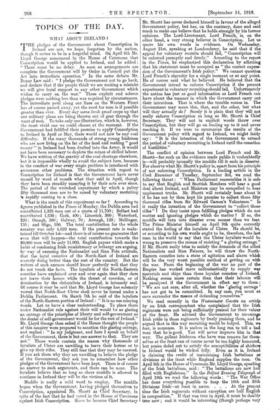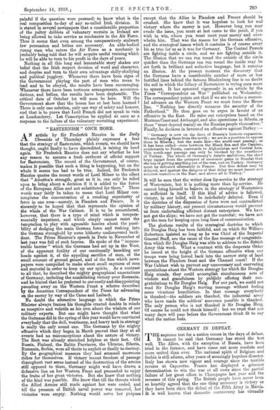TOPICS OF THE DAY.
WHAT ABOUT IRELAND ? THE pledges of the Government about Conscription in Ireland are not, we hope, forgotten by the nation, though it seems to be in a forgetful mind. On April 9th Mr. Lloyd George announced in the House of Commons that Conscription would be applied to Ireland, and he added : " There must be no delay. As soon as arrangements are complete the Government will by Order in Council put the Act into immediate operation." In the same debate Mr. Boner Law said : " I pledge the Government not to go back, and declare that if the people think we are making a mistake we will give loyal support to any other Government which wishes to carry on the war." These explicit and solemn pledges were nothing less than was required by circumstances. The immediate peril along our lines on the Western Front has of course passed away, yet the need for men is if possible greater than ever. Every day some fresh proof crops up that our military plans are being thrown out of gear through the want of men. To take only one illustration, which is, however, the most vivid one we could choose at the moment. If the Government had fulfilled their promise to apply Conscription to Ireland in April or May, there would not now be any coal difficulty. If the many thousands of strong young Irishmen who are now living on the fat of the land and making " good money " in Ireland had been drafted into the Army, it would not have been necessary to deplete the mines of skilled labour. We have written of the gravity of the coal shortage elsewhere, but it is impossible wholly to avoid the subject here, because in the conduct of war every single problem is interlaced with numerous other problems. The situation with regard to Conscription for Ireland is that the Government have never unsaid by word of mouth what they said in April, though they have been steadily unsaying it by their acts ever since. The period of the wretched experiment by which a paltry fifty thousand men are to be raised by voluntary recruiting 441 rapidly coming to a close.
What is the result of this experiment so far ? According to figures published in the Times of Monday, the Dublin area had contributed 1,325 men out of a quota of 11,700 ; Belfast had contributed 1,530 ; Cork, 400 ; Limerick, 300 ; Waterford, 320 ; Omagh, 300 • Galway, 70 ; Armagh, 120 ; Mullingar, 135 ; and Sligo, 100. The total contribution for the whole country was only 4,620 men. If the present rate is main- tained till October 1st—and there is of course no guarantee that even that will happen—the total contribution towards the 50,000 men will be only 11,000. English papers which make a habit of condoning Irish recalcitrancy or lethargy are ar, by way of excusing the Nationalist and Sinn Fein att tude, that the loyal counties of the North-East of Ireland are scarcely doing better than the rest of the country. But the writers of such excuses should know perfectly well that they do not touch the facts. The loyalists of the North-Eastern counties have explained over and over again that they dare not leave their homes while the threat of coercion, or of domination by the disloyalists of Ireland, is intensely real. Of course it may be said that Mr. Lloyd George has solemnly vowed that North-East Ulster shall never be forced under a Dublin Parliament. On March 7th he said of the loyalists of the North-Eastern portion of Ireland : " It is no use mincing words. Let us have a clear understanding. To place them under Nationalist rule a an outrage of the principeinabert s of liberty and self-government as t their will would be as glaring the denial of self-government would he for the rest of Ireland." Mr. Lloyd George then asked if the House thought the people of this country were prepared to sanction this glaring outrage, and replied : In my judgment, and here I speak on behalf of the Government, there is but one answer to that. They are not." Those words contain the reason why thousands of loyalists of Ulster are unwilling to leave their homes or to give up their rifles. They still fear that they may be coerced. If you ask them why they are unwilling to believe the pledge of the Government, they ask you to remember how other pledges of the Government have been kept. There is of course no answer to such arguments, and there can be none. The loyalists believe that so long as sheer muddle is allowed to continue in Ireland they will be the victims of it.
Muddle is really a mild word to employ. The muddle began when the Government, having pledged themselves to Conscription, appointed Mr. Shortt as Chief Secretary, in spite of the fact that he had voted in the House of Commons against Irish Conscription. Since he became Chief Secretary Mr. Shortt has never declared himself in favour of the alleged Government policy, but has, on the contrary, done and said much to make one believe that he holds strongly by his former opinions. The Lord-Lieutenant, Lord French, is, on the other hand, a very strong believer in Conscription. Let us quote his own words in evidence. On Wednesday, August 21st, speaking at Londonderry, he said that if the appeal for voluntary recruits should fail, " Conscription will be enforced promptly and firmly." According to the report in the Times, he emphasized this declaration by affirming that his statement must be accepted as " the correct expres- sion of the Government's Irish policy." We cannot question Lord French's sincerity for a single moment or at any point. He of course said what he believed. He believed that the Government intend to enforce Conscription if the present experiment in voluntary recruiting should fail. Unfortunately the nation has just as good information as Lord French can have about the manner in which the Government carry out their intentions. That is where the trouble comes in. The Government may mean this, that, and the other, but what will they actually do ? Surely it is plain that they will not really enforce Conscription so long as Mr.. Shortt is Chief Secretary. They will not in explicit words throw over Conscription, but they will go on leading up to it and never reaching it. If we were to summarize the results of the Government policy with regard to Ireland, we might fairly say : " It is the intention of the Government to extend the period of voluntary recruiting in Ireland until the cessation of hostilities."
The conflict of opinion between Lord French and Mr. Shortt—for such on the evidence made publio it undoubtedly is—will probably intensify the muddle till it ends in disaster. For observe what Mr. Shortt's policy is, apart from his principle of not enforcing Conscription. In a leading article in the Cork Examiner of Tuesday, September 3rd, we read the following threat : " When Parliament reassembles it is safe to say that English and Scottish Members will hear a good deal about Ireland, and Ministers may be compelled to hear unpleasant truths. Mr. Shortt will certainly hear about 'it if he has not by then kept his promise to collect those fifty thousand rifles from Sir Edward Carson's Volunteers." Is it really the intention of the Government to " collect those rifles" 3 Do they insist uponpledges which do not matter and ignoring pledges whfathil.info matter ? If so, the muddle will turn into disaster even sooner than we fear. The Prime Minister himself on April 9th quite correctly stated the feeling of the loyalists of Ulster. He should be, or according to his own words ought to be, therefore, the last man in the world to say that the Ulster loyalists would be wrong to preserve the means of resisting " a glaring outrage." If Mr. Shortt really tries to satisfy the demands of the allied Nationalists and Sinn Feiners, he will throw the North- Eastern counties into a state of agitation and alarm which will be the very worst possible method of getting on with the war. From the beginning of the war no part of the Empire has worked more enthusiastically to supply war materials and ships than these loyalist counties of Ireland. Nothing seems more- certain than that their labours will be paralysed if the Government in effect say to them : " We are not sure, after all, whether the glaring outrage ' has not got to be committed. In any case, you must at once surrender the means of defending yourselves."
We read recently in the Westminster Gazette an edicts by an Irish correspondent who complained that the Iriah regiments were not being sufficiently praised for their valour at the front. He advised the Government to encourage Irish pride in those regiments by freely praising them, and he argued that in this way recruiting would be helped. This, we fear, is nonsense. It is useless in the long run to tell a bad man that he is good. You will never improve him in that way. The gallant Irishmen who have won renown for them- selves at the front can of course never be too highly honoured, but prise doled out to satisfy the susceptibilities of shirkers in Ireland would be wicked folly. Even as it is, Ireland is claiming the credit of maintaining Irish battalions or divisions at the front while England supplies the men. On April 9th in the House of Commons-Mr. Lloyd George, speaking of the Irish battalions, said : " The battalions are now half filled with Englishmen." In the Belfast Evening Telegraph of April 19th we read the following words : " The War Office has done everything possible to keep the 16th and 36th Divisions Irish—at least in name. . . . At thepresent time the Irish regiments without exception are half English in composition." If that was true in April, it must be doubly true now ; and it would be interesting (though perhaps very painful if the question were pursued) to know what is the real composition to-day of any so-called Irish division. It is stated in several newspapers that a considerable proportion of the paltry driblets of voluntary recruits in Ireland are being allowed to take service as mechanics in the Air Force. Thus it seems that even among the comparatively stalwart few persuasion and bribes are necessary. An able-bodied young man who enters the Air Force as a mechanic is probably being told that he will acquire useful training which he will be able to turn to his profit in the days of peace.
Nothing in all this long and lamentable story shakes our belief that the Irish respect decision of word and character, and despise and turn to their own advantage shilly-shallying and political jugglery. Whenever there have been signs of the Government playing the part of men who mean to lead and to be obeyed, the results have been encouraging. Whenever there have been tortuous arrangements, accommo- dations, and bribes, the results have been deplorable. The critical date of October let will soon be here. Will the Government show that the lesson has at last been learned ? There is only one solution, only one way of safety and honour, and that is to prove that Lord French did not speak in vain at Londonderry.. Let Conscription be applied at once as a response to the failure of the voluntary recruiting experiment.



























 Previous page
Previous page